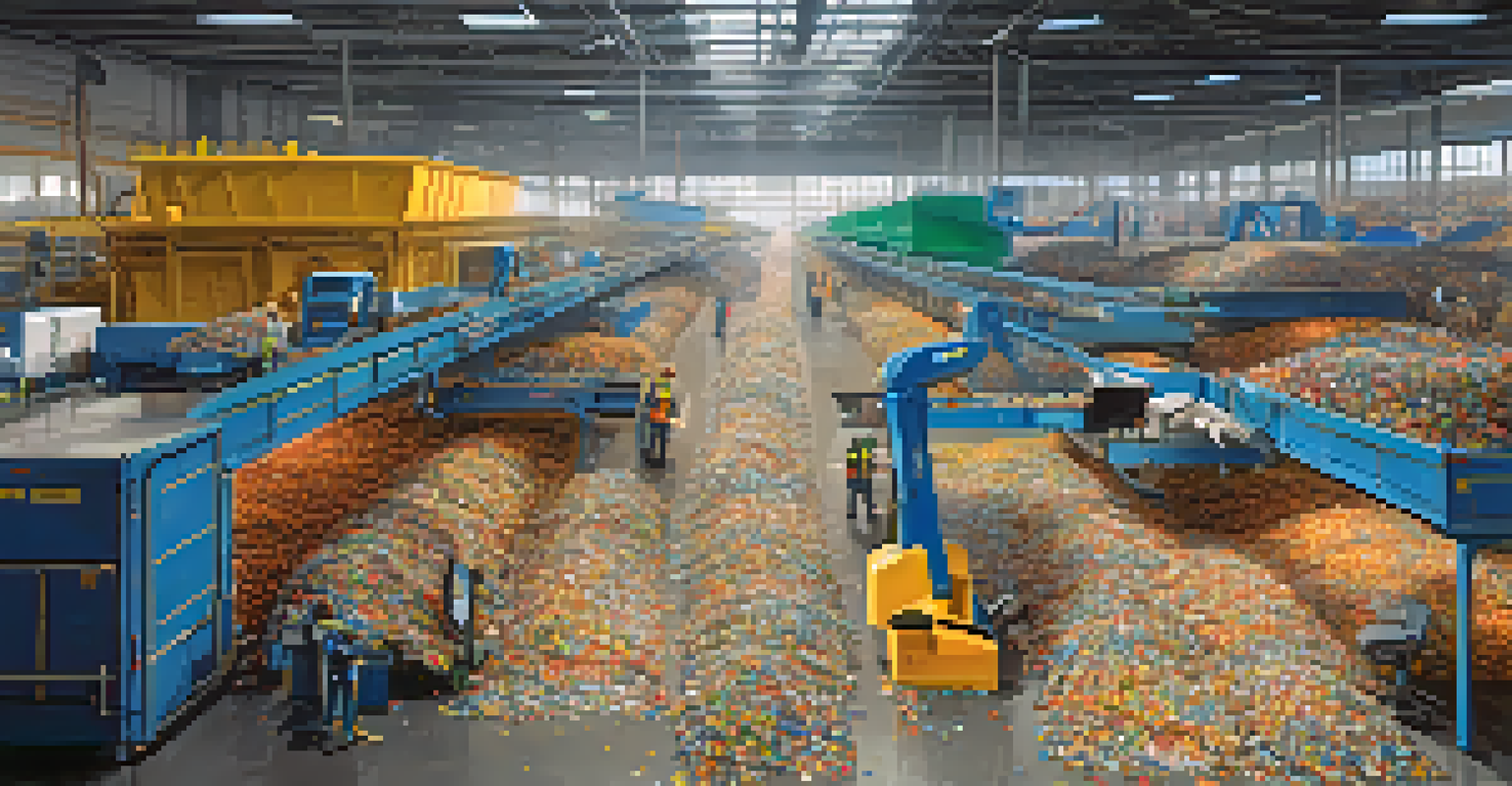Technologies Enabling Smart Waste Recycling Initiatives

The Rise of Smart Waste Recycling Technologies
In recent years, the need for effective waste management has led to the rise of smart waste recycling technologies. These innovations aim to make recycling more efficient, reducing landfill waste while promoting sustainability. Cities around the globe are adopting these technologies, transforming how we think about waste.
The greatest threat to our planet is the belief that someone else will save it.
By leveraging data and automation, smart waste recycling initiatives can optimize collection routes and identify contamination in recycling streams. This not only saves time and resources but also enhances the quality of recycled materials. For instance, cities like San Francisco are utilizing smart bins that can communicate when they need to be emptied.
As more municipalities recognize the benefits of these technologies, we can expect to see widespread adoption. This shift will not only improve recycling rates but also contribute to a cleaner environment, making it a win-win for communities and the planet.
IoT: Connecting Waste Management Systems
The Internet of Things (IoT) plays a crucial role in smart waste recycling initiatives. By connecting various waste management systems, IoT devices enable real-time monitoring and data collection. This connectivity allows cities to analyze waste patterns and make informed decisions about recycling processes.

For example, smart bins equipped with sensors can detect when they are full, sending alerts to waste collectors to optimize routes. This not only reduces fuel consumption but also minimizes the time spent on collection. Such efficiencies are essential for cities looking to manage waste sustainably.
Smart Tech Enhances Recycling Efforts
Innovative technologies like smart bins and IoT are optimizing waste management processes, leading to improved recycling rates and cleaner environments.
Ultimately, IoT transforms waste management into a proactive approach rather than a reactive one. With better data at their disposal, communities can engage in strategies that enhance recycling efforts while reducing costs.
AI and Machine Learning in Waste Sorting
Artificial Intelligence (AI) and machine learning are revolutionizing the way we sort waste. Advanced algorithms can analyze and classify materials with remarkable accuracy, ensuring that recyclables are separated from contaminants. This technology reduces the manual labor traditionally required in sorting facilities.
We do not inherit the earth from our ancestors, we borrow it from our children.
By employing AI-driven sorting systems, recycling facilities can dramatically increase their efficiency and throughput. For instance, some facilities can achieve sorting speeds of up to 10,000 items per hour. Such advancements not only improve recycling rates but also enhance the overall quality of materials recovered.
As AI continues to evolve, we can expect even greater innovations in waste sorting technologies. These systems will not only streamline processes but also contribute to a more circular economy, where materials are reused and recycled rather than discarded.
Data Analytics for Enhanced Recycling Strategies
Data analytics is at the heart of many smart waste recycling initiatives. By analyzing historical data on waste generation and recycling rates, cities can identify trends and patterns that inform their strategies. This data-driven approach enables communities to target specific behaviors and improve recycling outcomes.
For instance, analytics can reveal which neighborhoods have low participation in recycling programs. By understanding these trends, municipalities can develop targeted campaigns to encourage recycling and educate residents on proper practices. This tailored approach often yields better results than generic outreach efforts.
AI Revolutionizes Waste Sorting
Artificial Intelligence and machine learning are significantly increasing the efficiency of waste sorting, ensuring recyclables are accurately separated from contaminants.
Moreover, data analytics helps optimize resource allocation, ensuring that waste management teams are deployed where they are needed most. By harnessing the power of data, communities can enhance their recycling initiatives and foster a culture of sustainability.
Mobile Apps: Engaging Communities in Recycling
Mobile applications have emerged as powerful tools for engaging communities in recycling initiatives. These apps provide users with valuable information on local recycling guidelines, collection schedules, and even gamify the recycling process. By making recycling more accessible, these apps encourage participation.
For example, some apps allow users to track their recycling habits and earn rewards for consistent participation. This not only motivates individuals but also fosters a sense of community around sustainability efforts. When users see the collective impact of their actions, it can inspire even greater commitment to recycling.
By leveraging technology in this way, communities can create a culture of accountability and responsibility toward waste management. Mobile apps serve as a bridge between residents and recycling programs, making it easier for everyone to contribute to a cleaner environment.
Smart Bins: The Future of Waste Collection
Smart bins are rapidly becoming a staple in modern waste management. Equipped with sensors and connectivity features, these bins can monitor waste levels and communicate with waste management systems. This functionality allows for more efficient collection routes and reduces the likelihood of overflow issues.
Cities implementing smart bins have reported significant improvements in the cleanliness of public spaces. By ensuring that bins are emptied before they become full, communities can maintain a more attractive environment and reduce litter. Smart bins also often come with features that educate users about proper recycling practices.
Data Analytics Drives Recycling Success
Data analytics provides valuable insights that help municipalities formulate targeted recycling strategies, ultimately enhancing community engagement and participation.
As technology advances, we can expect to see even more innovative features in smart bins. For instance, some bins are being designed to compact waste, increasing capacity and reducing collection frequency. This evolution signifies a shift toward smarter, more sustainable waste management solutions.
The Role of Robotics in Waste Management
Robotics is playing an increasingly important role in waste management and recycling processes. Automated systems can handle heavy lifting, sorting, and even transporting waste materials, allowing humans to focus on more complex tasks. This not only increases efficiency but also improves workplace safety.
For example, robotic arms can sort recyclables with precision and speed, outperforming traditional manual sorting methods. Some facilities are even experimenting with drones for monitoring waste levels in hard-to-reach areas, showcasing the versatility of robotics in this field. The integration of robots can significantly reduce operational costs and improve recycling rates.

As the technology continues to advance, we can anticipate even broader applications for robotics in waste management. Such innovations will pave the way for a more efficient, safer, and sustainable future in recycling.
Creating a Circular Economy Through Smart Recycling
The ultimate goal of smart waste recycling initiatives is to foster a circular economy. This concept emphasizes the continual use of resources, minimizing waste and promoting sustainability. By implementing advanced technologies, communities can effectively close the loop on waste and encourage responsible consumption.
Smart recycling initiatives not only focus on recycling but also on reducing overall waste generation. By educating consumers on product life cycles and encouraging the use of sustainable materials, we can shift societal norms toward more eco-friendly practices. This holistic approach is vital for creating lasting change.
In conclusion, the technologies enabling smart waste recycling initiatives are transforming how we manage waste. By embracing these innovations, communities can work toward a cleaner, more sustainable future, ultimately benefiting both the planet and future generations.